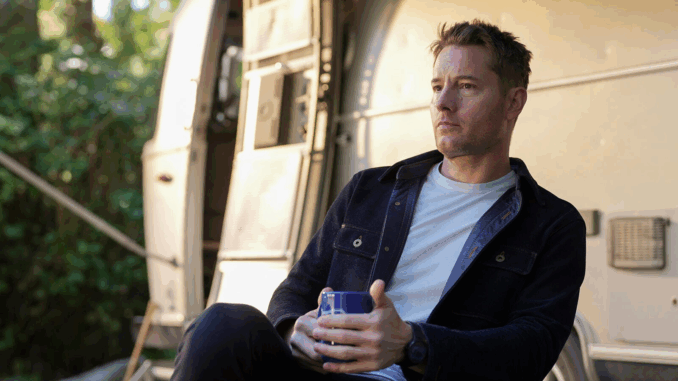
Beyond the Last Scene: When the Camera Stops Rolling, What Happens to the Rescued?
In Tracker, the thrill lies in the chase — the rapid clues, the rugged roads, the tense face-offs, and the quiet but fierce heroism of Colter Shaw. Episode after episode, viewers are swept up in suspense, waiting for that pivotal moment when the missing person is found.
But have we ever truly paused to consider what happens after?
What happens when Colter drives away, leaving behind people whose lives will never be the same again?
This is the emotional terrain Tracker dares to touch — subtly, fleetingly — but deeply enough for the most attentive viewer to feel its weight. Because in real life, finding someone isn’t the end of the story. It’s the start of something new, something fragile, and often something painful.
Colter Shaw: The Catalyst Who Never Stays for the Consequence
Colter Shaw isn’t just a tracker. He’s a human catalyst — appearing in moments of crisis, unraveling the chaos, and stitching just enough hope together for people to hold on. And then, like smoke, he’s gone. No goodbye parties. No emotional debriefs. Just a nod, a silent glance, and the low hum of his motorcycle disappearing into the distance.
This is part of the mystique that makes Colter so compelling. But it’s also what makes the aftermath so haunting.
To Colter, it may have been another case. Another job completed. But to the people he helps, he becomes an unshakable memory — a figure who arrived when no one else did and gave them a second chance at life. And with that chance comes everything they must now face: grief, guilt, trauma, healing.
Survivors Are Not Always Whole: The Psychological Debris of Being Found
There’s a profound, often unspoken truth about missing persons: many of them come back, but they never return the same. The damage they’ve endured isn’t erased by a warm embrace or a joyful reunion.
Take the teenager rescued from an underground trafficking network. The episode ends with relief and tears, but what about the night terrors that come later? The inability to trust anyone again?
Or the young man found after being manipulated and isolated by a cult-like group. He may be “free,” but his beliefs, his identity, and his sense of self have been fractured.
Tracker doesn’t linger on these realities for long, but it hints at them in poignant glances, in the heaviness in the eyes of those rescued. These subtle choices make the show far more than procedural drama — they give it a soul.
Families Reunited — But Not Unbroken

It’s easy to romanticize reunions — the tearful hugs, the long-awaited phone calls. But Tracker knows that trauma ripples through more than just the victim. It ripples through families.
Mothers who blamed themselves. Siblings who grew up too fast. Partners who moved on — or never did.
When someone is found, it often forces loved ones to confront their own unresolved pain. Colter doesn’t stick around to see it, but his impact reaches far beyond the rescue itself.
In one particularly emotional episode, a father is reunited with the daughter he never knew he had. The scene is touching, but beneath it is a sea of what-ifs, missed years, and unspoken questions. The show doesn’t spell it out — and that’s what makes it powerful.
Colter’s Quiet Burden: Saving People Doesn’t Always Mean Healing Them
One of the most fascinating undercurrents of Tracker is Colter’s own relationship with aftermath. He saves people, yes. But he rarely sees the long-term effects of his interventions. And perhaps, that’s deliberate.
Colter carries the trauma of his own family. His father’s paranoia, his brother’s disappearance, and his mother’s evasiveness have left him permanently guarded. It’s easier to stay on the move. Easier not to form attachments.
By refusing to witness the long-term struggles of those he helps, Colter protects himself from a truth he knows too well: you can bring someone back, but you can’t always fix what was broken.
The Ripple Effect of a Tracker’s Touch
Even though Colter vanishes from the scene, the people he rescues — and the lives he changes — don’t forget. His presence lingers like a ghost. Some keep searching for him. Others simply remember.
That’s what makes Tracker so distinct from other crime series. It’s not about glory or closure. It’s about the echoes left behind — in the survivors, in their families, and in Colter himself.
Every case is a chapter. Every rescue, a door cracked open to healing. And every goodbye, a reminder that salvation comes with a cost.
Conclusion: The Quiet Legacy of the Man Who Doesn’t Stay
Colter Shaw doesn’t need recognition. He doesn’t seek fame. What he leaves behind isn’t medals or headlines — it’s people whose lives he’s changed, often in ways they can’t fully understand.
He’s a ghost in their memories. A myth in their stories. The man who found them when they were lost — and left before they could say thank you.
In the silence that follows the rescue, Tracker reveals its most poignant truth: saving someone is only the beginning.
